The well-being of others is central to Lara Rupnawar’s motivations as a mechanical engineering student, undergraduate researcher, and Catalyst Scholar and Mentor in the College of Engineering.
As a research intern working with Naomi Fitter, associate professor of robotics and Kearney Faculty Scholar, Rupnawar participates in robotics studies focusing on improving the medical experience of children and veterans with disabilities. She connected with Fitter through Oregon State’s URSA Engage program.
“I was thinking about graduate school to study robotics, so I reached out to her and expressed interest in her research projects related to assisting people with disabilities — specifically the GoBot,” Rupnawar said.
The GoBot is a short, cylindrical robot that shoots balls, bubbles, and ribbons from a central tube. The playful bot was designed to enrich the experience of toddlers going through physical therapy and to promote their physical activity. Rupnawar’s role was to analyze data related to the project.
Developing robots that assist others
Rupnawar is also developing her own robot, intended to assist veterans undergoing physical therapy at skilled nursing facilities focused on long-term care. The humanoid robot, Jamie, strikes therapeutic poses that residents are meant to mimic. Rupnawar has built friendly and joyful behaviors into Jamie’s demeanor — including dancing, handshaking, and waving — all with an eye to increase residents’ time spent on physical therapy.
“Research has shown a significant disengagement of veterans at these facilities,” Rupnawar said. “We are proposing a new solution to facilitate social and physical engagement by integrating robotics into this environment.”
Overall, Rupnawar says, she enjoys the creative, friendly atmosphere of Fitter’s lab, as well as its focus on helping underserved communities.
“I love the people here and all the different projects,” Rupnawar said. “They hit close to my heart. I want my engineering work to help people and improve their wellbeing and lifestyle; I want to make life accessible for everyone.”
Building community and fostering inclusion
Recognizing another opportunity to increase inclusion, Rupnawar is pursuing a minor in Spanish. Through an independent study with Raven Chakerian, senior instructor of Spanish in the College of Liberal Arts, she’s developing bilingual materials for STEM outreach workshops to be held on campus by the Oregon Migrant Leadership Institute. Fitter’s lab leads some of these workshops.
“I noticed a need for bilingual resources because some program participants prefer speaking in Spanish,” she said. “And that’s cool for me, because it’s a new side to learning Spanish — learning technology terms and describing them.”
This kind of outreach ties into Rupnawar’s interest in building community for people of color in STEM, which is manifested by her involvement in Oregon State’s chapter of the Louis Stokes Alliances for Minority Participation, an initiative to increase the number of students from traditionally underrepresented communities earning bachelor’s degrees in STEM fields.
“I’ve slowly built this network of other people of color in STEM that I can hang out with and talk to about similar experiences and interests, including many of my fellow Catalyst Scholars, with whom I’ve become very close,” she said.
Rupnawar has brought this closeness into her role as a Catalyst mentor for Ivette Alonso Garcia, a mechanical engineering undergraduate student and Catalyst Scholar.
Catalyst mentors are juniors and seniors in the Catalyst Scholars Program who support first-year Catalyst Scholars in managing academics, navigating finances, looking for apartments, identifying study spots, and anything else that promotes their success. Many Catalyst Scholars are first-generation students who particularly benefit from this type of guidance.
“I want my mentees to enjoy their first year and know that I have their back,” said Rupnawar, who also mentors Alonso through their mutual involvement as Ford Family Foundation scholarship recipients. “I had all these great experiences when I was mentored. My mentors influenced how I look at engineering and how I'm pursuing my education, and now I want to pass that on to others.”
As part of her Catalyst Scholarship, Rupnawar has access to discretionary funds for experiential learning opportunities each year. She plans to apply these funds toward living expenses in Portland this summer during her internship with Intel, where she’ll be working with the company’s dielectrics manufacturing group.
“I’ve been involved in research for three years now, so I’m curious to see how industry will feel,” she said.




